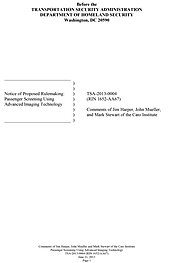The euphemism “Advanced Imaging Technology” fails to describe the technology at issue in the instant rulemaking. It would be more accurate to call them “nude body scanners.” The machines look under the clothes of travelers, as a traditional strip-search does, without actually stripping the person. Obscuring language like “AIT” is just one dimension of the indifference to privacy shown in the preamble and the proposed rule, which does not account for the privacy concerns that prompted the court to order this rulemaking.
As to the substance of the rulemaking, the proposed rule fails fully to articulate the TSA’s policies, existing or proposed, with respect to the use of body scanners at the nation’s airports. It thus fails to fulfill the order of the D.C. Circuit Court of Appeals in EPIC v. TSA.
Secret classification of the agency’s “risk-reduction analysis” is not warranted by law or policy, and it fatally undercuts the requirements in administrative law and related executive orders that require the agency to perform and publish various analyses. Risk management and cost-benefit analysis can easily be conducted without revealing technical details or threat information that may legitimately be kept confidential. The agency must conduct risk management and cost-benefit analyses of its policies so that its policies can be examined for rationality and sufficiency under the law.
Independent, scholarly, and unchallenged risk management and cost-benefit analyses of the use of body scanners in U.S. airports have been made. They find that the machines fail overwhelmingly to reduce risk enough to justify their costs—even assuming they work effectively. Among the costs produced by TSA policies is this area is disinclination to travel by air, which is quite safe relative to automobile travel. Thus, TSA policies may result in increased mortality among travelers.
Having taken twenty months to issue a deficient proposed rule and utterly lacking analysis, the TSA has abused the rulemaking process to the detriment of the public, some of whom may needlessly be killed due to current TSA policy. The only appropriate remedy is for TSA to suspend its body scanning policy and commence a new rulemaking, adopting whatever policy emerges from that rulemaking. Otherwise, some Americans may die awaiting the resolution of this rulemaking, the appeals that follow it, and the new rulemaking that those appeals will inevitably produce.



